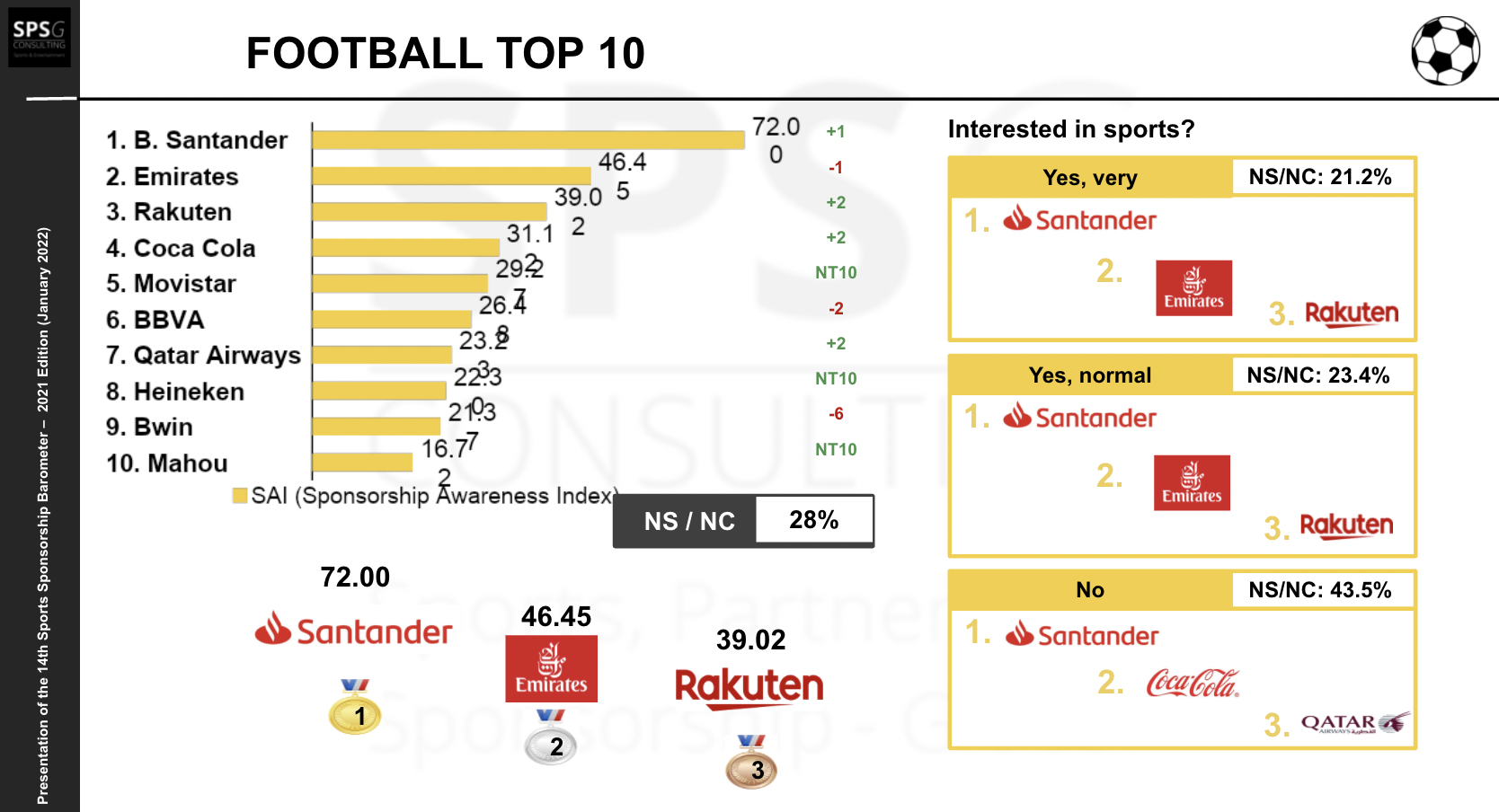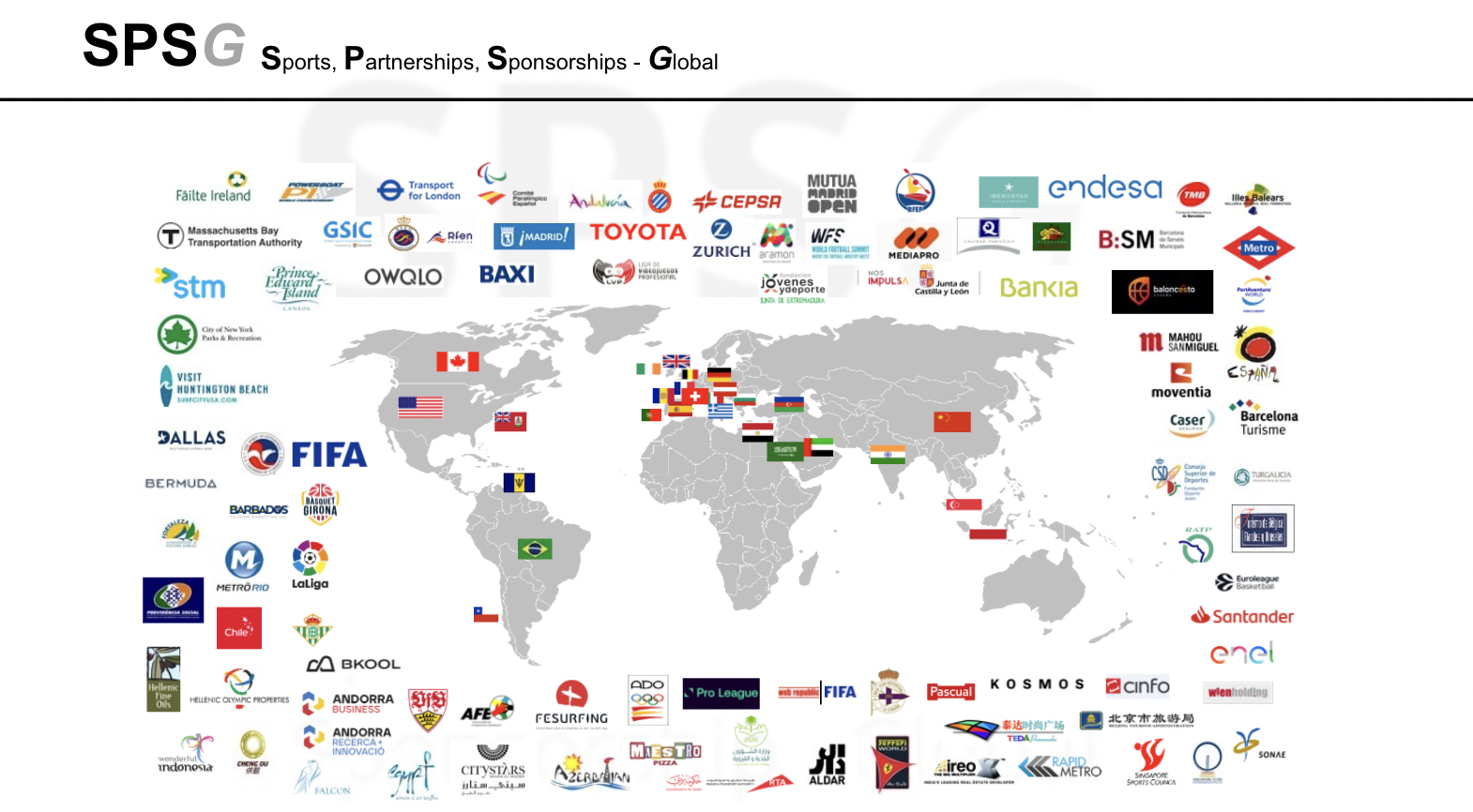Carlos Cantó, CEO at SPSG Consulting, outlines the company’s findings from its Sports Sponsorship Barometer that focuses on the latest sponsorship trends in the football industry. This report first featured in the latest edition of WFS Digest, our new insider’s guide to the latest and most relevant thoughts and practises from within the football industry. You can subscribe to WFS Digest HERE.
This January, SPSG Consulting released and presented the 14th edition of its Sports Sponsorship Barometer, a must-read report that provides annual information in four areas:
- Sponsorship insights from brands’ perspectives (in Spain)
- Sponsorship insights from properties’ perspectives (in Spain)
- Sponsorship insights from fans’ perspectives (in Spain), and mostly focused on the awareness of brands associated to sports, specific properties (athletes, clubs, leagues, events, etc.), as well as their opinion about athletes with the best image
- Sport Business Trends (worldwide)
The international footballers with the strongest brand image are Lionel Messi, Cristiano Ronaldo, Kylian Mbappé, Karim Benzema and Neymar
The main results of the report are:
The brand perspective
- Besides “Brand visibility” and “Category Exclusivity”, brands are mostly interested in the following sponsorship rights: “Social media presence”, “Hospitality”, “Media presence”, “Co-creation of unique projects along with the properties” and “Revenue generation”.
- When it comes to activation of the sponsorship opportunities in five years time, brands are interested in activating by investing in eSports, Big Data, Virtual Reality, Gamification, Fan Token and NFT.
- By 2025, brands are expecting an increasing importance of “Phygital” sponsorship activation, as well as to activate “with purpose”, whether would be with environmental and/or social elements.
The property perspective
- Properties consider that they need to provide further assistance and guidance to brands in terms of projects and assets to develop, as well as they have to do a better job related to the sponsorship reporting process.
- Among the innovations that will provide properties (clubs, federations, leagues, events, etc.) a better chance to monetise and/or reduce costs, properties prioritise Big Data, Fan Token, NFT and eSports (despite the fact that eSports was better ranked in previous years).
- According to the properties, investment funds and affluent businessmen/women (and companies) will be the predominant owners of elite sports entities by 2025.

The fan perspective (awareness of brands associated with sports and selected properties)
- Coca-Cola, Santander, Movistar, Red Bull, Iberdrola, Rakuten, Heineken, BBVA, Vodafone, CaixaBank and Emirates are the top brands that are associated in Spain with sports (jn general).
- When it comes to, specifically, football, top 5 brands that are mentioned are: Santander, Emirates, Rakuten, Coca-Cola and Movistar.
- The report also asked about the association with selected football properties, including:
- Lionel Messi: Adidas, Nike, Pepsi
- Cristiano Ronaldo: Nike, Adidas, CR7
- Real Madrid: Adidas, Emirates, Nike, BWin and Audi
- FCBarcelona: Nike, Rakuten, Qatar Airways, Unicef and Beko
- Atlético de Madrid: Nike, Plus500, Adidas, Mahou and Capital Energy
- FIFA: Adidas, Nike, Coca-Cola, Heineken and Visa
- UEFA Champions League: Heineken, Adidas, Nike, Coca-Cola, Playstation, and Mastercard
- Spanish Football Federation: Adidas, Iberdrola and Nike
- LaLIga: Santander, Nike, BBVA, Adidas and Movistar
- The Spanish footballers with the strongest brand image are: Andres Iniesta, Sergio Ramos, Iker Casillas, Gerard Piqué and Joaquín.
- The international footballers with the strongest brand image are: Lionel Messi, Cristiano Ronaldo, Kylian Mbappé, Karim Benzema and Neymar.
Sport Business Trends:
- The elite sports, in general, and specifically football, are evolving rapidly, also due to the new preferences of the audience and the fans (moving from the avid fans to the fluid fans, a combination of avid and casual fans).
- Environmental, Social and Governance issues are pivotal for the football industry moving forward. Football properties should be more pro-active in tackling the main challenges of our world.
- Innovation in football is not about technology, but about solutions to fix nuclear topics that are implemented. Technology is a mean, a tool to improve. At the end of the day, innovation, also in football, is about people, processes, leadership and communication.
- Investment funds and corporate conglomerates are considering the football industry as a place to invest, due also to the increase of the professionalism in the sector across the board. Names such as City Football Group, Ares Management, Fenway, KSE, CVC, SEH, SEG, RedBird, Silver Lake, OVG, Bruin Capital, Aser Ventures, Grupo Pachuca, MLSE, Dyal, Harris Blitzer, Arctos, Kosmos, Apex Capital, etc. are more and more active within the sports, and football, ecosystem.
For further information about the conclusions of the report that SPSG Consulting put together, contact Carlos Canto, CEO, at carlos.canto@spsgconsulting.com.
This report first featured in the latest edition of WFS Digest, our new insider’s guide to the latest and most relevant thoughts and practises from within the football industry. You can subscribe to WFS Digest HERE.

